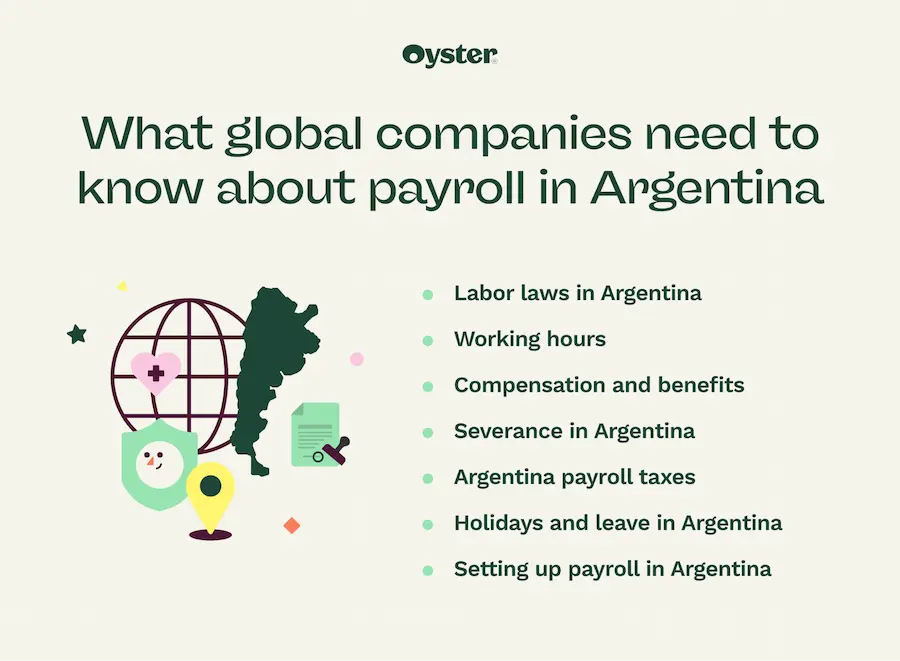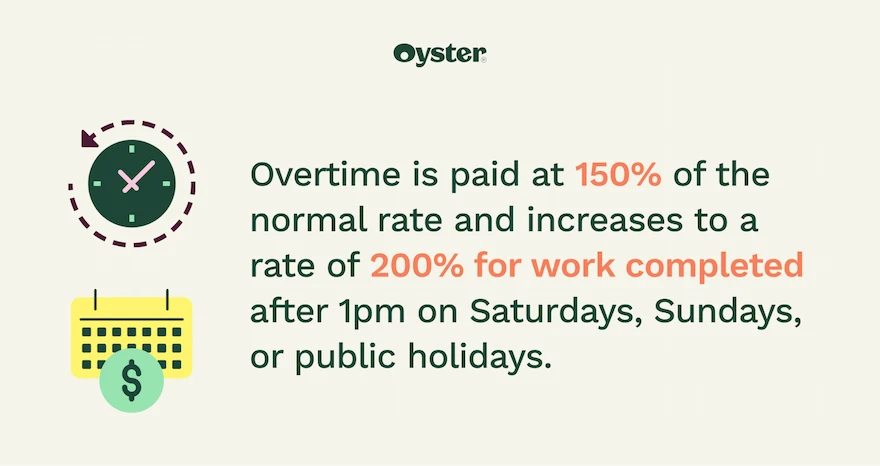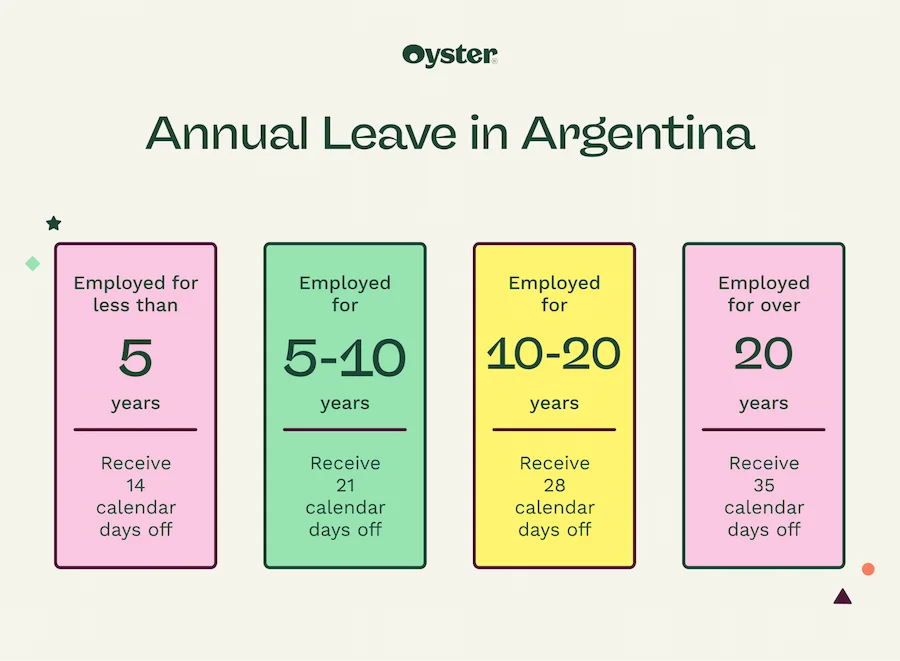For employers looking to expand their team into South America, Argentina is a great source of international talent. The country has seen stable economic growth and has a booming industrial sector. With a population of 43 million people, there are many skilled workers that can support your company’s expansion into South America.
If you decide to hire in Argentina, you will need to first understand the local employment laws around payroll and payroll processing. In this blog post, we’ll go over the important labor laws and payroll requirements that you should know before you make your first hire.

Labor laws in Argentina
Before hiring in Argentina, you should know that Argentina has strong worker protections and labor unions. It’s one of a few countries that gives a full scope of employee rights to all employees, regardless of their contract type. Argentinian labor laws are governed by the Argentine Constitution, international treaties, the Employment Contract Law, several federal statutes, and collective bargaining agreements. They are enforced by the National Ministry of Labor.
Labor laws protect the rights of workers and prevent employers from mistreating their employees. These are some in Argentina that you should be aware of:
- No written contract is necessary to determine an employment relationship in certain situations. This means that written contracts are not a legal requirement for full-time employees.
- Employers have the right to terminate a position without any obligation of compensation.
- Non-compete agreements cannot exceed a maximum of two years (save for a few exceptional cases).
Working hours
It’s important to understand the general working hours so that you can plan for meetings, coordinate schedules, and set appropriate communication expectations for your teammates.
In Argentina, work days are generally limited to eight hours per day and 48 hours per week, Monday through Saturday, and work on Saturday must end at 1:00pm. However, managers and directors are exempt from these restrictions.
Workers in Argentina might have more strict limitations on their working hours if their work is considered unhealthy (like working in an environment with decreased air quality) or if their work takes place at night (between the hours of 9:00pm and 6:00am). In these instances, employees can’t work more than six or seven hours per day. Night shifts are paid at a rate of 150% of the usual salary if worked on a regular day, and 200% of the usual salary if worked on Saturday after 1:00pm, Sunday, and holidays.
If you’re hiring in Argentina, you should also account for an afternoon siesta—a down period in the afternoon that is generally observed outside of the capital, Buenos Aires—when scheduling Argentinian employees. Employees are entitled to at least 35 rest hours during the weekend, starting at 1:00pm on Saturday until midnight on Sunday. Employers must account for at least 12 resting hours between each shift. Employees that work on rest days are paid at a rate of 200% of the usual salary and are entitled to a paid period of rest that’s equal to the duration of the shift worked on a rest day.
In Argentina, overtime is limited to three hours per day, 30 hours per month and 200 hours per year. Employees are paid overtime at a rate of 150% of their regular salary.
Compensation and benefits
There are several common compensation and benefits requirements that employers should be aware of:
- Minimum wage applies regardless of age or experience of the worker.
- Overtime is paid at 150% of the standard rate and increases to 200% for any work completed after 1pm on Saturdays or any time on Sundays or public holidays.
- Full-time employees are eligible for one extra month of salary; half is paid in June and the other half in December. (This is known as the 13th month salary!)
- The employee is eligible for certain contributions. On top of an employee’s gross salary, employers must pay an additional 25-30% in employer contributions. Contributions are determined by the Federal Administration of Public Income (AFIP) and can differ based on an employee’s contract
- Non-compete agreements must include compensation for the employee at the rate of at least 50% of their monthly salary

Severance in Argentina
In Argentina, employers can terminate employment at any time without a justified cause. If an employee is within their probation period, the first three months of employment, the employer must provide 15 days’ notice, but doesn’t have to pay severance.
Employees may receive one month’s salary for each year of employment at the highest rate they earned during the course of their tenure. If the employee is terminated for economic reasons, this does not apply, and employees receive half a month’s pay for each year of employment.
Argentina payroll taxes
Employers contribute 25.53% of an employee’s salary to social security. Both residents and non-residents are charged on their income at the same rates, based on their income bracket.
Holidays and leave in Argentina
Holidays
If you’re working with team members in Argentina, you should know that there are 12 public holidays. Expect your teammates to take the following days off:
- January 1: New Year
- Monday and Tuesday of Carnival
- March 24: National Day of Memory for Truth and Justice
- Holy Friday (Date Varies)
- April 2: Veterans and Fallen Day in the Falklands War
- May 1: Labor Day
- May 25: May Revolution Day
- June 20: Pass to the Immortality of General Don Manuel Belgrano
- July 9: Independence Day
- December 8: Day of the Immaculate Conception of Mary
- December 25: Christmas
The following dates are considered transferable national holidays:
- June 17: Step to the Immortality of General Don Martín Miguel de Güemes
- August 17: Step to the Immortality of General Don José de San Martín
- October 12: Day of Respect for Cultural Diversity
- November 20: National Sovereignty Day
If these holidays fall on a Tuesday or Wednesday, the time off is given on the Monday of that week. If the holiday falls on a Thursday or Friday, the time off is taken on the following Monday.
There are also a number of non-working days that are recognized for individuals who identify with different identities and religions. For example, Jewish employees may receive Rosh Hashana (two days), Yom Kippur (one day), and Pesach (first and last two days) off. Muslim employees received Muslim New Year, the day after the culmination of fasting, and the day of the Feast of Sacrifice off. Those of Armenian descent may take off April 24 to participate in activities to recognize the Armenian Genocide.
If a team member is required to work during a holiday, they should be paid at a rate of 200% of the regular salary. Though you should know that work on holidays can’t exceed 30 hours per month, or 200 hours per year.
Annual leave
The amount of annual leave that employees receive is based on their tenure in the workforce.

Employees must work at least half of the working days of the calendar year to qualify for these entitlements. If an employee hasn’t worked for six months, they receive one day off for every 20 days worked. Up to a third of the annual leave may be carried over from previous calendar years.
Sick leave
Everyone gets sick from time to time. In Argentina, employers must provide paid leave in the case of illness or an accident. The amount of paid sick leave employees receive, like annual leave, is based on tenure. Those with less than five years receive up to three months; those with five or more years, or with a dependent, receive up to six months; and those with five or more years and a dependent receive up to 12 months.
If an employee is unable to continue their work after this time period, they may take an additional 12 months of unpaid leave. Following this period, the employee may be fired if they are unable to return to their job.
Maternity leave
Pregnant employees receive 45 days of unpaid leave before childbirth and 45 days of unpaid leave after childbirth. Employees may choose to take less leave before childbirth, but are required to take at least 30 days prior to childbirth. The days that were forfeited before the birth may be reallocated to time off after childbirth. During the unpaid period of time off, employees receive social security benefits that are equivalent to their regular salary.
Mothers can take three to six months of additional unpaid leave if they’ve been with your company for at least a year. If the employee decides to resign, they’re eligible for a farewell bonus of 25% of the mandatory severance pay. Individuals that are breastfeeding may take two 30 minute breaks during the day for up to a year from childbirth. Fathers can take two days of paid leave.

Setting up payroll in Argentina
When hiring international talent, companies can choose to set up payroll internally or to outsource payroll functions.
Setting up payroll in-house can be a complex and time-consuming process, since companies need to consider and keep up with a number of labor laws in order to remain compliant. Managing registrations, tax payments, and social security requirements places a lot of pressure on HR teams, and takes away their time from other important tasks. Global employment platforms like Oyster make it fast and easy to manage international payroll and automate compliance across 180+ countries.
Looking for a tool to help you get started with growing your team in Argentina? Get a deep dive of the Oyster platform!

About Oyster
Oyster is a global employment platform designed to enable visionary HR leaders to find, hire, pay, manage, develop, and take care of a thriving distributed workforce. Oyster lets growing companies give valued international team members the experience they deserve, without the usual headaches and expense.
Oyster enables hiring anywhere in the world—with reliable, compliant payroll, and great local benefits and perks.














_Leader_Leader%201%20(2)%20(3).svg)
_Leader_UnitedKingdom_Leader%201%20(1).svg)
_Leader_Europe_Leader%201%20(1).svg)
_Leader_Mid-Market_Leader%201%20(1).svg)
_Leader_Small-Business_Europe_Leader%202%20(2).svg)
_Leader_Small-Business_Leader%201%20(1).svg)
_FastestImplementation_Small-Business_GoLiveTime%201%20(1)%20(1).svg)